Israel at 75: Ex-soldier, Muslim leader and others reflect on the Jewish state's legacy
One fought in Israel’s War of Independence. Another escaped Nazi Germany on the “Voyage of the Damned.” A third runs a Muslim school in New York City but saw his life change after Sept. 11.
They have vastly different backgrounds but share a common vision: that the Jewish people and the entire world need a state of Israel.
The Middle Eastern country celebrates its 75th anniversary this year. On May 14, 1948, Zionist leader David Ben-Gurion declared Israel’s independence, fulfilling a centuries-old dream of a Jewish state in the Holy Land but also touching off decades of war, terrorism and conflict.
The occasion is celebrated each year on the corresponding date of the Hebrew calendar, the fifth day of Iyar, which fell this year on the eve of April 25 and 26.
Kelly: This tragic sign of our times sits in front of North Jersey synagogues
To mark the milestone, NorthJersey.com and the USA TODAY Network interviewed a cross-section of tri-state area residents with unique ties to Israel. Here are their stories.
(These excerpts have been edited for space and clarity.)
Eva Wiener
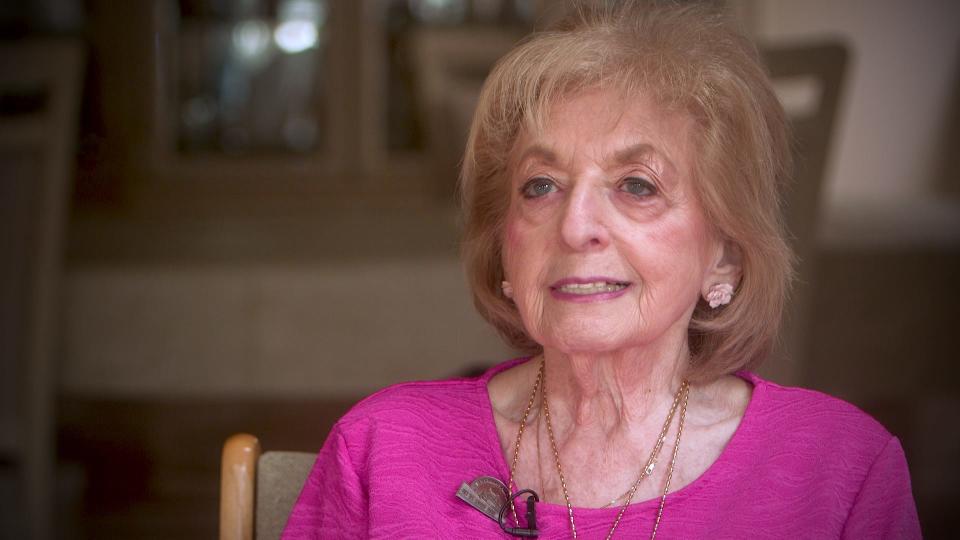
She survived the "Voyage of the Damned" during the Holocaust. With antisemitism rising again, a Jewish homeland is "all the more important," she said.
A resident of Neptune, Wiener is among the few living survivors of the MS St. Louis, the ill-fated cruise liner that departed on May 13, 1939 from Hamburg, Germany, with 937 Jewish refugees seeking freedom from Hitler's regime. Today, Wiener, 84, frequently speaks at schools around the country about her family's experience on what is infamously known as the Voyage of the Damned.
Turned away: Wiener was a toddler when her parents boarded the St. Louis and departed Nazi Germany with great fanfare. The ship was bound for Havana, but no country, including Cuba and the United States, would permit entry to the passengers. When they reached Havana, one man on the boat was so distraught at being turned away that he slit his wrists and jumped overboard. "The whole thing was a propaganda ploy orchestrated by the Nazis," Wiener said. "They wanted to show they were doing the world a favor by eliminating these people that nobody wanted."
Gustav Schroeder, the ship's captain, refused to return to Germany, where the passengers would face certain death. Eventually, four countries agreed to take them in: England, France, Belgium and the Netherlands. "My father requested to go to England because he wanted as much distance between us and Germany as possible. It was a wise decision. Unfortunately, nearly 300 other passengers who found themselves in other countries ended up being killed in concentration camps."
The family waited out World War II in London's bomb shelters, and later moved to the U.S. and, eventually, the Jersey Shore.
Why Jews need Israel: "Had there been a state of Israel at that time, the St. Louis tragedy would not have unfolded the way that it did," Wiener said. "Here were 900 Jews looking for a safe haven. Had there been an Israel, these refugees would have had a place to go.... My father's two sisters remained in Berlin. One of them was killed in the concentration camps and the other disappeared and we have no idea what happened to her. A third sister remained with her husband and their child in Antwerp, and they too were killed in concentration camps."
"The current rise of antisemitism in America is frightening. Hatred against Jews has always been there but now it's rearing its face in full view. That makes Israel all the more important."
Moshe Labi
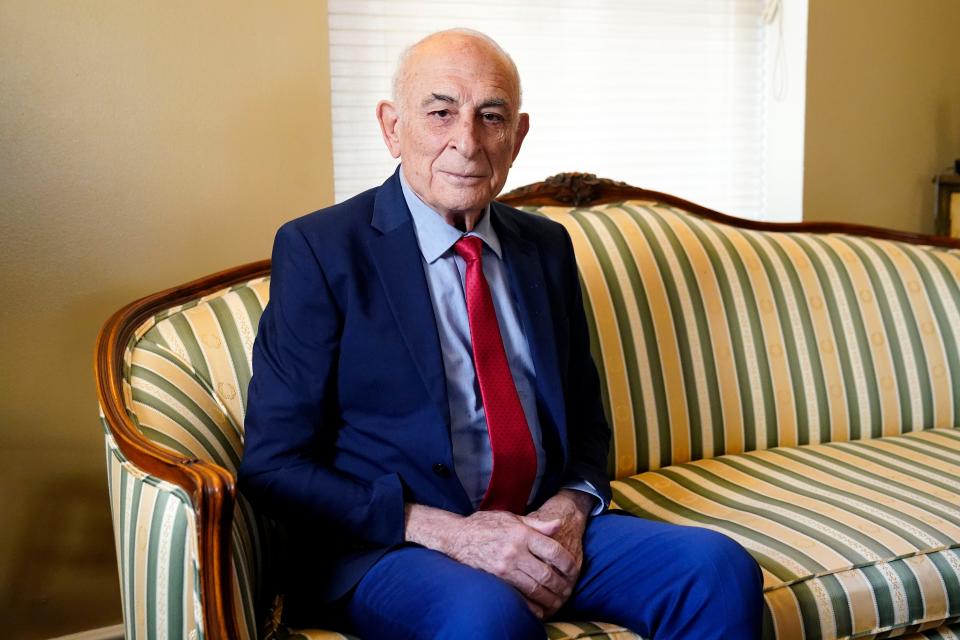
He fled the Nazis and joined Israel's War of Independence, achieving "the dream of 2,000 years."
Labi, 92, a physician now retired in Manhattan, was born in Benghazi, Libya. Life there was peaceful until 1938, he recalled, when the fascist Italian government that controlled the region began passing antisemitic laws.
Fleeing fascism: In 1940, after war broke out, Labi's father was taken to a concentration camp. "Although he returned to us alive, he never recovered from that experience," his son said. The family fled to Egypt, "but the Germans kept advancing so we continued running. We escaped to Sudan for a while but when we had the chance to go to Palestine, which was then under British rule, we took it."
In Palestine, Labi joined the Haganah, a Jewish paramilitary group, at age 16. He later became an officer in the Israeli Defense Forces, working to train new recruits. "We didn't have a real army or real weapons. But we needed fighting soldiers who could defend our new state."
From exhilaration to civil war: The United Nations in November 1947 passed a resolution to partition Palestine into separate Jewish and Arab states. "Everyone was exhilarated and ran out into the streets to celebrate," Labi said. "We danced and sang with flags in our hands all night long. It's hard to describe the joy and happiness. We were simply overjoyed to have our own state in our own homeland."
"But the Arabs immediately rejected this and attacked. So there was a sense of anxiety because while there was happiness, it also felt like someone was putting a knife to our throat.
"We did not have a real army because it was illegal for Jews to have weapons and the British confiscated any weapons from Jews at that time. So we had to hide them or else we would end up in prison. We had to defend ourselves, so we banded together and fought back. Everyone had to be taught how to use arms. It was important to create a new army. I had been trained as a squad leader and was in charge of training the new recruits. We were all just volunteers.
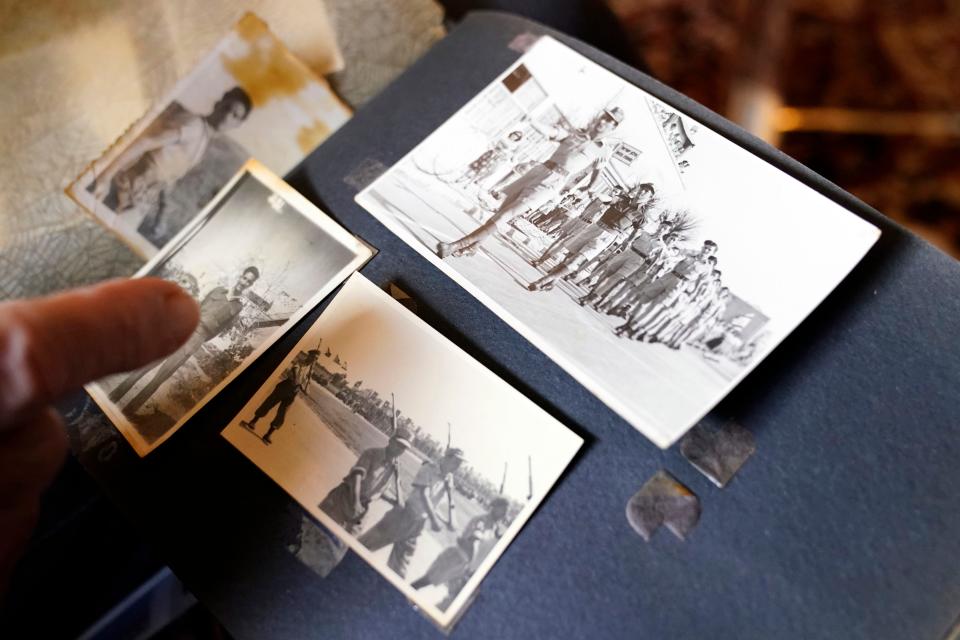
Declaration of independence: On May 14, 1948, Israeli leader David Ben-Gurion declared Israel an independent state. The surrounding Arab states declared war and invaded. "The British left, but we were too busy fighting to celebrate," Labi said. "There was anxiety about the future. The roads connecting Tel Aviv and Jerusalem were under siege and water and food had to be rationed."
"Eventually, the Arabs realized they couldn’t win the war, and in 1949, an armistice agreement was signed. I am very proud of this. I cannot take this history away from my personality. I feel that it's an accomplishment. I belong to a generation that came through with the dream of 2000 years."
After 75 years, a 'great satisfaction:' "It has been an exhilarating 75 years and Israel is a country that is respected throughout the world for its achievements in many different fields. There's a great satisfaction I feel that is hard to express in words. On the other hand, we still don't have peace and that is very sad."
Tal Brody

Israel's Mr. Basketball gave up a shot at NBA career to find "a Jewish home"
Brody, 79, grew up in Trenton before becoming a legendary pro basketball player and goodwill ambassador for Israel. While playing for the University of Illinois in 1965, he was drafted by the National Basketball Association's Baltimore Bullets. He turned down the offer, instead opting to play professionally for Maccabi Tel Aviv.
He became an iconic figure in Israeli sports when, in 1977, his squad defeated a heavily favored Soviet Red Army team. As Israelis poured onto the streets to celebrate, Brody exclaimed to Israeli media, "We are on the map! And we are staying on the map − not only in sports, but in everything!" His declaration, repeated by politicians, became part of the Israeli lexicon.
What Israel means to him: "When I came to Israel, I felt like I was in a Jewish home. I loved being in a country where there were so many Jews and they were speaking Hebrew. I fell in love with the culture and life."
Even though there are many people demonstrating in the streets for democracy, the protestors are holding Israeli flags and singing the national anthem. We may disagree but we still love our country.
Tal Brody, Israeli pro basketball legend
"People ask me all the time, how could you give up a career in the NBA to play basketball in Israel? I've enjoyed a beautiful 56 years here in Israel. I would never give that up. I felt how proud the Jewish communities in eastern and western Europe were when we won against their best teams.
"It was a bigger challenge than just helping one team. When our team won the championship, the whole country was proud of us. It meant a lot to the country and to its morale. More than 150,000 people welcomed us back to Israel as national heroes."
More at stake: Brody has served in both the Israeli and U.S. Army. "In America, you can lose a war and it will continue to exist. In Israel, everyone knows you cannot afford to lose. Everyone in Israel know its history, how we had suffering in the past and were thrown out of other countries going as far back as the Roman and Greek eras."
"A study recently came out saying that Israel is ranked fourth among countries where people are happiest. We are a very democratic country with over 20 political parties, and even though many people feel there needs to be changes in the judicial system, and even though there are many people demonstrating in the streets for democracy, the protestors are holding Israeli flags and singing the national anthem. We may disagree but we still love our country."
Joseph Gitler
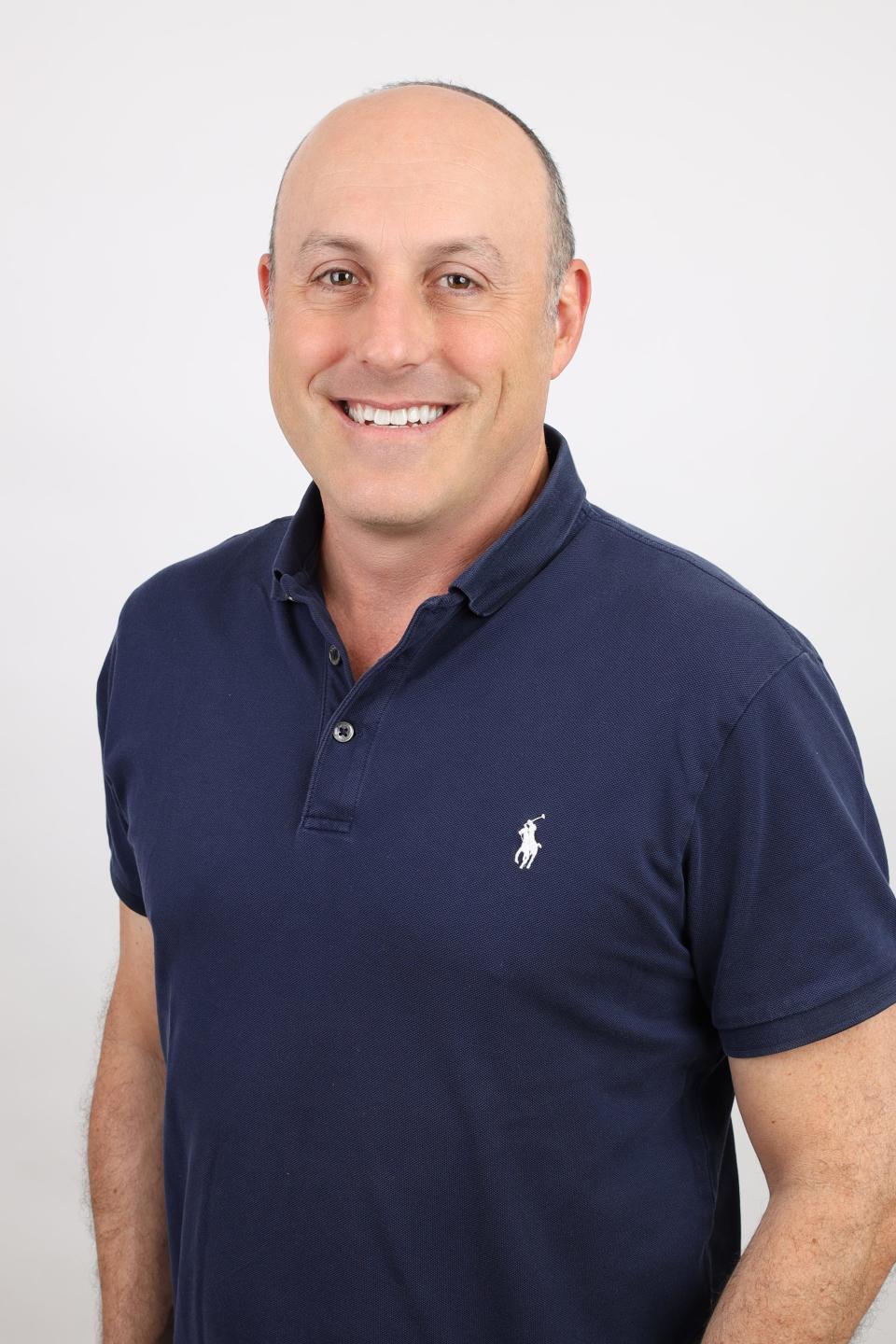
The North Jersey philanthropist feeds the needy in Israel. Its Jewish culture feeds his soul..
Gitler, a 49-year-old attorney and former Teaneck resident, lives with his family in Ra'anana, Israel. In 2003, he founded Leket Israel, a national food bank that distributes over 58 million pounds of produce and perishable items annually to Israel's needy − Jews, Muslims, Christians and African refugees. In 2014, the Jerusalem Post named him one of the 50 most influential Jews in the world.
What motivated him? "I read a news item years ago saying that said despite Israel's success as a startup nation, thousands of Israelis are still living below the poverty line. I'd go to weddings and see how much food was being thrown away and that was very upsetting to me. So one night, I asked the caterers if I could pack the excess food and distribute it to homeless shelters in the area. They were delighted by my idea and asked if they could help."
"Eventually, the operation grew, as word spread about what I was doing, and I received calls from shelters and caterers around the country. Today, we are a huge operation that last year, provided over 2 million meals to battered women shelters, at risk youth, the homeless, Holocaust survivors and Meals on Wheels programs.
A lifelong dream: "Leaving Teaneck was difficult − my wife and I were happy there. But I have wanted to live in Israel since I was a teenager studying in yeshiva day schools and attending the Israel Day Parade every year. Israel, after all, is a central aspect of Judaism and is a part of our daily prayers. I love that this is a Jewish state, and you can see signs wishing people a 'chag sameach,' a happy holiday, on the highway, and the cashier at the supermarket wishes everyone a `Shabbat Shalom,' a good Sabbath.
"It's also a great place to raise Jewish children: my kids have a lot of freedom here and there's no place that I can't bring them. Despite the tense political environment and disagreements with the government, Israel is a great place to live."
Sheikh Musa Drammeh
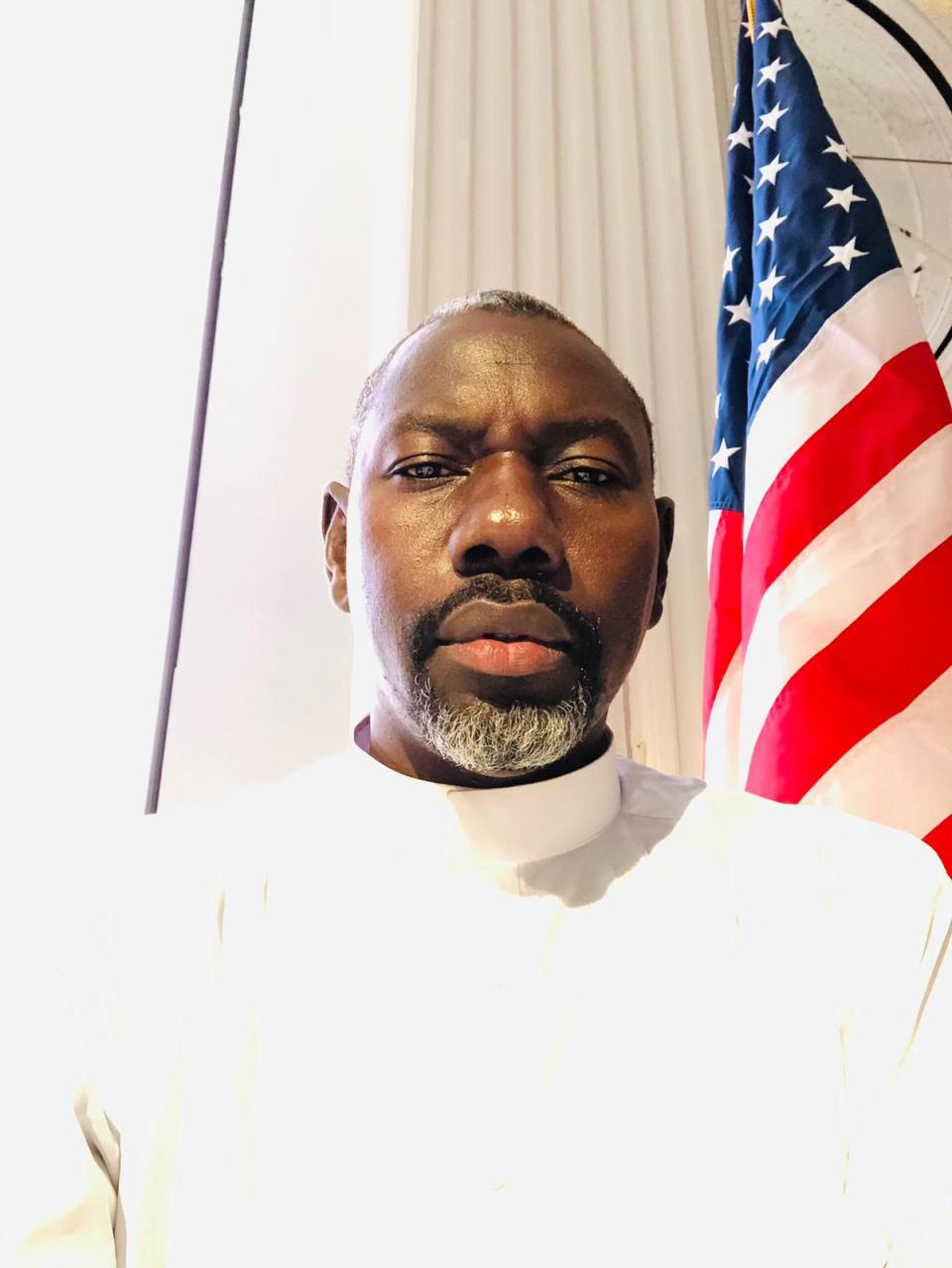
A New York Muslim leader's cause: strengthening ties with Israel
Drammeh, chairman of the Islamic Cultural Center of North America in the Bronx, says he aims to bring together different religious groups. The Gambian immigrant works with several synagogues on interfaith events and founded the Muslims Israel Dialogue series in 2013. He has visited Israel several times. "The feeling and honor of being in the Holy Land is indescribable," he said. "I have great hope for Israel."
A new purpose: "I was born in Gambia and came to New York in 1986 at age 24 because I wanted to be the richest African man in the world. Then 9/11 happened and that changed everything for me. I was reborn and gained a new purpose in life. I realized I didn't need money or material things. I just wanted to serve humanity and bring Blacks, Jews and Muslims and humanity together."
I want the world to know that Israelis and Palestinians are unique peoples who deserve peaceful coexistence and that their children deserve to live in peace, instead of running to bomb shelters.
Sheikh Musa Drammeh
'We should live side by side:' "For a Muslim to say that it's time for Muslims to embrace Israel as an independent state like any other state is a force of its kind. Some are upset with me and say `how dare you normalize Zionism!' I say we should live side by side. I firmly believe that for the Muslim world to be good Muslims they must adopt Israel like any other nation and they must not be antisemitic or anti-Israel. They must not normalize a threat to Jewish people. We must never condone violence against any person. We need to all be creatures of love and fairness."
His hope for Israel's 75th anniversary: "I want the world to know that Israelis and Palestinians are unique peoples who deserve peaceful coexistence and that their children deserve to live in peace, instead of running to bomb shelters."
Blake Flayton
The 22-year old moved from New York to Israel, a place he feels "undeniably tethered to" despite political turmoil.
Flayton, a former Manhattan resident, is a graduate of George Washington University in Washington and a columnist for the Jewish Journal, a Jewish weekly.
His story: "I grew up in a Reform Jewish community where Judaism was less about faith and more about social justice. I moved to Israel because it's one way for young Jews in the Diaspora to live full and authentic Jewish lives. But my "aliyah," or move to Israel, was also inspired by the growing antisemitism I observed on college campus. In college, for the first time, I began to feel the ways Jews have often felt: like 'The Other.'"
His feeling for Israel: "My favorite thing about Israel is most certainly the fellow young people I’ve met from all around the world since arriving here. We all share a certain idealism, a certain level of rebelliousness and optimism. In Israel, even a liberal, gay atheist can still be a fundamental part of the Jewish story. Simply by speaking Hebrew and living by the Hebrew calendar, Israelis are undeniably tethered to their people and that which we have created."
Challenges: "Every day there are new dramatic developments both in the country and in the region that implicate security and stability. I feel that the stakes are much higher here than in the U.S. The recent change in the government is one example. I have been participating in protests against the government and have not missed a single demonstration in Tel Aviv.
"I find the protests to be an almost religious experience. It is a gathering of proud Jews and Zionists, electrifying the air with the intoxicating power of our shared beliefs. The belief is in a Jewish and democratic state, a liberal, cosmopolitan society protecting and nourishing Jewish culture. That is the promised land for me. I am most proud that Israelis are able to get up in the morning and carry on with their daily routines as if we are not living in some of the most extraordinary circumstances in history."
Deena Yellin covers religion for NorthJersey.com. For unlimited access to her work covering how the spiritual intersects with our daily lives, please subscribe or activate your digital account today.
Email: yellin@northjersey.com
Twitter: @deenayellin
This article originally appeared on NorthJersey.com: Israel 75th anniversary: NJ Jews, Muslims reflect on legacy

